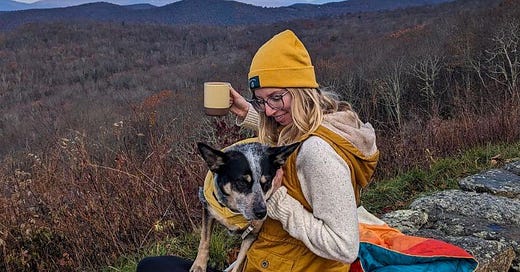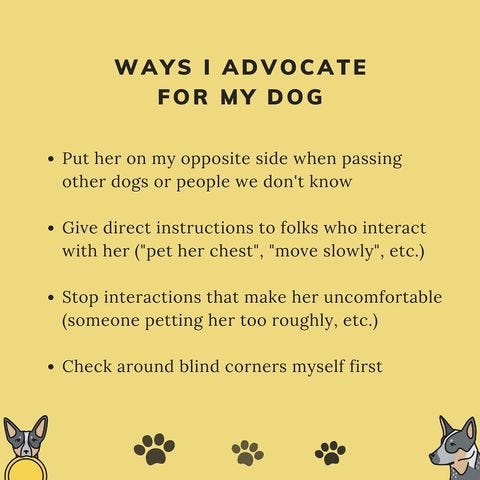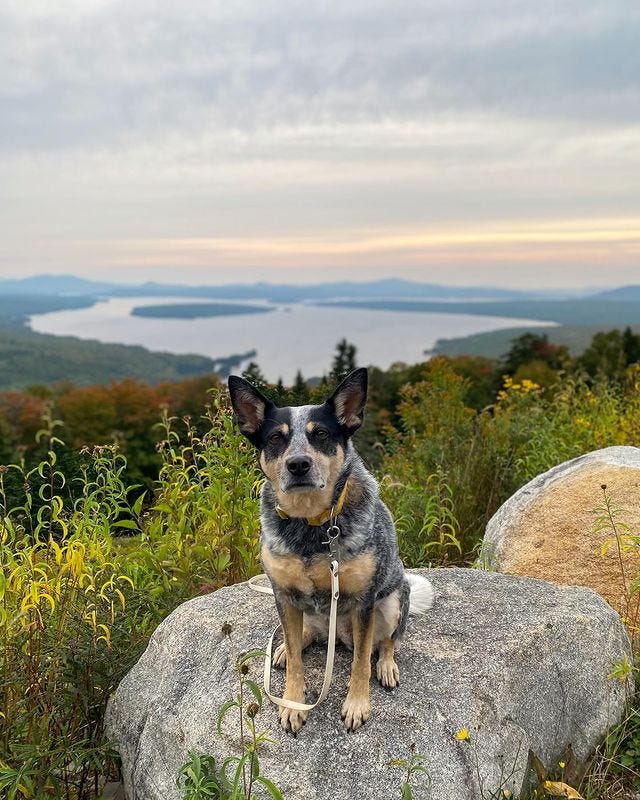Validation I needed earlier in my journey with my dog
I’ve long struggled to feel “good enough”. Most of this pressure has been self-imposed, especially when it’s come to my blue heeler’s training — I have high standards and have let ego take the reins far too many times — but hearing the right things from the right people can make a world of difference.
So here’s some validation I wish I’d gotten years ago. (And that I’ve now learned to give myself freely.) My hope is that it might help fellow dog owners feel a little more normal, accepted, and confident as we navigate this world with our companions
It’s okay if your dog doesn’t like certain things.
I once felt that the end-all-be-all of a “good” dog was extreme and total tolerance. If we were “good” owners who knew how to train our companions, they would be able to handle everything under the sun without complaint, right?
That is not true. And believing it was incredibly unfair to Scout.
It is my job to help my dog move through the world around us in a productive, healthy way. It is my responsibility to make sure she doesn’t negatively impact others in shared public spaces. It is my duty to get her used to grooming and veterinary care and other necessary tasks!
But it is not reasonable to expect that I can wave a magic wand — or even put in hundreds of hours of dedicated, thoughtful training and counterconditioning and desensitization — and somehow make it so that she’s never upset. Never uncomfortable. Never expresses an opinion that differs from my own.
It’s okay if your dog doesn’t like certain things. My guess is that you don’t, either… and you’re still an acceptable member of society
(For my part, I hate the dentist, and large crowds where I get bumped unexpectedly, and light touch that feels like tickling more than affection. Some of Scout’s examples are head pats, and being wet, and walking against strong winds.)
It’s okay if your dog doesn’t have dog friends
(as long as they’re otherwise fulfilled).
Yes, domestic dogs are a social species. Yes, some dogs love interacting with other animals. But no, dog park visits and playdates and off-leash group hikes are not set-in-stone requirements of a good life! Despite the narrative of our increasingly pet-friendly (and increasingly crowded) social world, it’s not natural for dogs to greet every other creature they pass.
If your dog wants to have dog friends? If they enjoy meeting new pets and romping about? Then it’s my sincere hope you find a way to fit those experiences into your shared life.
If your dog is happy with a smaller circle of loved ones, though? If they get to express natural behaviors and receive affection from you and feel satisfied in other meaningful ways? You’re not doing anything “wrong”.
It’s okay to set boundaries with other people & pets around your dog.
I am a people pleaser. I am also the caretaker of a sensitive, nervy dog. These roles often do not mix well.
For a long time I struggled to have Scout’s back for fear of offending sweet strangers who wanted to say hi or fellow owners who thought our dogs should play or family members who were used to confident pets they could roughhouse with. I was afraid that if I set boundaries — “she doesn’t like to be pet like that”, “please don’t touch her when she’s in a command”, “we don’t do on-leash greetings” — we’d be branded as a difficult dog with her difficult owner.
(Oh, the thoughts I have here about being a woman. How deeply I’ve internalized that “difficult” is one of the worst things I could be.)
But we have every right to say no to uncomfortable, unproductive situations. We have every right to give instructions to people who want to interact with our pets (especially when those guidelines exist to set everyone up for success). Your dog’s trust in you matters more than a strangers opinion — and your commitment to your companion, who you will be responsible for throughout their entire life, should rank higher than the brief disappointment of another loved one.
We should push ourselves to grow and compromise when we can. And we should also absolutely set boundaries.
It’s okay if life with your dog doesn’t look like someone else’s.
Every dog, owner, and environment is different. Your priorities might not match your best friends or your parents or your coworkers or that guy you passed on the street. And there’s no reason they should. We all live our own lives!
Plus social media is rarely an accurate look at another person’s day-to-day reality (even if we do try our best to share authentically). Just because something seems awesome when it happens to someone else across the country doesn’t mean we’d actually think it was awesome if it happened to us.
At the end of the day, you are the one who has to wake up in the morning and live with your decisions… and live with your dog. Yes, it’s important to consider the people we care about (and our impact on the greater world around us) when setting goals — but it’s okay if our choices are a weighted average that heavily prioritizes our own preferences and considers our own resource constraints.
It’s okay if your dog isn’t your entire life.
From the moment I brought Scout home, I have identified as a “dog nerd”. I wanted to be the best possible owner. I surrounded myself with fellow handlers who train their dogs to a high degree, who dedicate much of their free time to sports trials and enrichment activities, who in short set the bar really damn high.
Sometimes I felt guilty for doing things without my dog.
But in order to take good care of Scout? I need to take good care of myself. That requires balance in all areas of my life — including the parts of my identity that have nothing to do with being her guardian.
I hope your dog is one of the biggest, most important things in your world. I hope you factor them into your decisions, ask yourself if they’re fulfilled, and go out of your way to give them the best experiences you can. But I also hope you know that you are no less of a fantastic dedicated amazing wonderful owner if they are not, alone, your everything.
Your dog is not a direct reflection of you or your worth.
Many trainers like to say things like “your dog is your mirror”. That there are “no bad dogs, only bad owners”. That “dogs match their human’s energy”.
There is some truth underneath those statements. My dog is absolutely affected by me. But no, she is not a direct reflection of me.
Looking at Scout isn’t quite like looking in a mirror. It’s more like looking at a painting framed with a glass cover, maybe. I can see parts of my own face inside — and the lighting, surrounding environment, colors of the art itself affect how much or how little — but it’s still a picture in its own right. The piece isn’t blank if I’m not standing in front of it.
You have great capacity to shape your dog. To help them grow. It is an honor to guide them through the world! But not all of your dog’s traits are your “fault” or even in your control. Our pets are individual, intelligent, social creatures with their own personalities. To assume they are our perfect mirrors would be to minimize their inherent value separate from us, I think. (And as I’ve written about before, it would also paralyze us under the weight of some unproductive blame.)
Every relationship has arguments
(yes, even the really healthy wonderful ones).
Earlier in my life with Scout, I thought maybe I was crazy for being stressed out and overwhelmed and frustrated with my dog when so many people around me only had wonderful things to say about theirs. (Don’t get me started on all the claims about pets being panaceas for mental and physical health.)
I have a tendency to focus in on specific moments. A single win feels like the ultimate success… and a single mistake feels like the end of the world. If it felt like Scout and I were in conflict, I’d worry that all was lost. We had failed. I had failed.
But we aren’t defined by any single event. Our relationships — dog and human both — are built up of hundreds of interactions. Not all of those interactions will make our bellies laugh and our hearts sing. They don’t have to for our connections to still be worthwhile.
We can love each other. We can argue. These are not mutually exclusive.
It’s okay if you adjust your goals over time.
It doesn’t mean you’ve failed.
When I first adopted Scout, I had visions of a “go everywhere do everything” dog. I wanted to include her in all parts of my life all the time. She’d come with me to get the mail, and visit friends, and sit at restaurant patios, and scale hiking trails, everything in between… and it would be perfect. It would be glorious.
When her dog reactivity first surfaced after she got attacked, I was devastated to grieve the life I’d hoped we had. “Walk by a dog on the street without any barking” seemed so much wimpier of a pursuit than “be the perfect cafe companion” or “get her Canine Good Citizen“.
But it was okay to adjust our goals over time. It was important.
Over the years, we’ve accomplished just about everything I had first dreamed of doing with Scout. But I had to free up my expectations first — and meet her where she was at — in order for us to achieve a greater level of success beyond just “survive the day”.
As time has gone on and things have changed — our environments, our preferences, our tolerances — so too have our goals. It’s okay to decide something really doesn’t matter to you (even though you used to think it did) or that actually you want to focus on a goal you’d never thought about before because suddenly it’s relevant.
The worst thing you could do is box yourself in to an arbitrary checklist before you’ve even considered the details actually at hand.


















